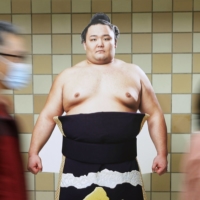Ozeki Asanoyama’s punishment for breaching the Japan Sumo Association’s COVID-19 protocols is expected to be handed down within the next few days.
Although a final ruling is yet to be confirmed, sources close to JSA decision-makers say the Takasago stable man appears set to escape with a suspension rather than being forced to retire.
If Asanoyama somehow manages to avoid being kicked out of the sport after denying — then later admitting — that he had dined out at a hostess bar, it would be a further sign of changing attitudes within sumo.
Retirement — especially of the jump-before-being-pushed kind — has long been the standard consequence for major transgressions.
Whether the offense involved drugs (as in the case of Russians Wakanoho, Roho and Hakurozan), violence (Asashoryu and Harumafuji), gambling (Kotomitsuki) or match fixing (23 men in 2011), almost any serious deviation from expected behavior has resulted in the end of wrestlers’ careers.
Even relatively minor indiscretions have had serious repercussions if committed by yokozuna, as grand champions are generally held to a higher standard.
Yokozuna Maedayama was forced into retirement in 1949 after being photographed at a baseball game in Tokyo while the tournament he had withdrawn from was still going on in Osaka.
Lying to the JSA, police or investigators has also invariably brought down the hammer on anyone not taking responsibility for their actions.
That standard — along with Asanoyama’s prominent position in the sport — could still mean that a suspension along the lines of what rank-and-filer Abi received for a similar offense wouldn’t be seen as sufficient.
Further counting against the ozeki is the fact that his lies resulted in JSA public relations department head Shibatayama being put in the embarrassing position of publicly denying something that later turned out to be true.
A decade ago Asanoyama would likely have already been forced out of sumo entirely, but the special circumstances surrounding the ongoing pandemic seem to have accelerated change towards more lenient and less terminal sanctions.
Irrespective of whether Asanoyama is forced into retirement or the ozeki is suspended for a set number of tournaments, there are legitimate issues with the handing down of punishment of any kind.
The first of those involves the JSA’s restrictions themselves. While the association deserves to be commended for how it has handled COVID-19 in the wake of Shobushi’s death, the organization’s strict protocols haven’t reflected what has been happening in society at large.
Trains and buses in the Japanese capital have continued to be packed full of unvaccinated commuters since the pandemic began, and toothless “states of emergency” haven’t prevented large numbers of people from eating, drinking and shopping as normal.
For rikishi, socializing has always been one of very few existing avenues of escape from the monotony and oppressive nature of life in a stable. Being denied their only remaining method of stress relief while the rest of the country carries on as normal is arguably an unreasonable burden for any twenty-something — especially with social media also being off limits.
Had everyone else in Japan observed the same protocols, perhaps the medical system wouldn’t be on the verge of collapse with deaths at all-time highs nearly 18 months into the pandemic. As things stand, however, it seems the JSA is one of the few groups to have given the coronavirus the serious attention it deserves right up to the present day.
At the risk of venturing into whataboutism, it’s also fair to ask why young athletes should lose their careers over eating out with friends when government officials and even the prime minister have attended parties in contravention of their own rules — yet received little more than a light dressing-down by the media.
Nor should it be forgotten that the only reason the JSA is moving lock, stock and barrel to Nagoya while a pandemic is still raging is because those same politicians have ensured its home arena is unavailable thanks to an event that risks bringing huge devastation to Japan.
Despite this country’s borders being mostly closed to new entrants since last year, tens of thousands of athletes, officials, sponsors and media personnel from over 200 countries will descend on the capital in July for a Summer Games that is being forced on Japan despite strong public opposition.
Ending the careers of rikishi for meeting friends or supporters while the Kokugikan hosts an event that could potentially create several new COVID-19 strains and create havoc with the health and lives of millions is unconscionable.
To be clear, Asasnoyama broke the rules — and in doing so put the lives of his stablemates and opponents at risk. If his career ends this week, he only has himself to blame.
Similarly, Abi and Ryuden can consider themselves fortunate to still have jobs at a time when COVID-19 has devastated the food service industry — where many rikishi find themselves after retirement.
Still, outrage should be tempered, as few people could handle the restrictions rikishi have been expected to endure over the past 15 months — especially when those in charge of creating and implementing the country’s COVID-19 protocols have shown such callous disregard for those same rules.
At the end of the day, whether or not the restrictions under which rikishi have been forced to live constitute an unreasonable burden — during a time when few if any others have endured similar curtailments — is a matter of debate but likely won’t factor into Asanoyama’s punishment.
As egregious as the ozeki’s actions were, it’s easy to feel a certain amount of sympathy when looking at the larger picture.
Only time will tell whether or not those extenuating circumstances are enough to save his sumo career.
In a time of both misinformation and too much information, quality journalism is more crucial than ever.
By subscribing, you can help us get the story right.
SUBSCRIBE NOW




